|
|
Sunday Notes: WWDC Expectations and Rumors; Text Anlaysis with the Nalaprop Utility; Apple and Netflix Viewing; Star Wars Sounds by AppleBy Graham K. Rogers
The essence of WWDC is the introduction of new technologies to developers who are to write the software that we will enjoy in the next year (and more). They have to know how to handle the new features, the new APIs and the hardware that will be coming. For many, the main point of WWDC is the Keynote address, still expected to be a video presentation, on Day 1. In this hour or two of announcements and linked video shorts, the updates to the operating systems, with their new features, will be outlined. Let me emphasize that word, "Outlined". There will be some specifics, particularly if there is a new feature that Apple wants us to admire, but many of the new ways in which our devices will be able to operate will not be announced on the day. Some things will filter through. Some will be noticed in beta releases. Some will not be picked up until the OS is released to the public. There may be a hardware announcement; many are hoping for some information on the Mac Pro, but few are expecting details of the iPhone 14.
Cam was asked to produce a before and after video of his studio setup. Even in the relatively brief clip it is easy to see why he was chosen. The talent is clear. Some people just see things in a different way. I hope he is invited to Cupertino and I look forward to Apple helping other young people in similar ways. I looked at the original video on YouTube and skimmed through hundreds of positive comments. There was one negative: a buyer of a new Mac who describes it as trash as he could not transfer files from a Windows system: as if that had never been done before. Among the comments were some from Cam's high school acquaintances who had positive comments about his talents a few years back.
Writing on 9to5 Mac, Alison McDaniel outlines the source of the problem and points out that Apple sent out an information notice on 18 April warning of the changes. The rules had been updated by the Reserver Bank of India (RBI) last October and "banks now need approval from customers through "Additional Factors of Authentication (AFA)" for recurring transactions like subscriptions". She adds that "The new rules also state that Apple has to set up an e-mandate for customer cards", although it is not clear if this requirement only applies to Apple. I think not. The easiest way is to use the AppleID and top that up. Needless to say, despite the warnings and the point that this is due to RBI regulation changes, some customers think this is Apple's fault. According to India Today the reason is clear: "RBI rules break Apple payments in India"; while several sources in India and elsewhere cover this tightening up by the authorities, Rahul Verma (Business Insider India) makes it clear that, although Apple has garnered the most publicity on this, it does affect other merchants. What is now required is that, ". . . merchants have to set up fresh e-mandates from customers and two-factor authentication for each recurring transaction. Users are also required to give their consent using CVV numbers and OTP for any payment over 5000 Rupees". I wonder if Apple hopes that adding credit to customer accounts will be so unpopular that the RBI may reverse its decision.
This free software is for text analysis. When a text is dropped into the first of three panels in the second column it displays the content with parts of speech shown in different colors. That is really useful for anyone trying to understand how a sentence worked, but with further analysis it "compiles a frequency list of words used according to their part of speech". I dropped some content I am working on currently that is about 5,000 words long and almost immediately the different parts of speech were shown. When I asked the utility to go further a list of words showed me how often I was using certain words. I am aware (and often edit out) too many versions of "use", "user" and "used" from early drafts, and there are other words I inwardly look for. Naloprop also showed me how many times I had used "can" (20), "will" and "might", which I intend to examine before the text is finalized. I was made aware that the verb, "write" had been used 20 times, but as this is a planned book on writing, that may not be a problem. A MultiParse option reveals the frequency of word roots. These options are highly useful for those who write, edit or analyze text. I was unable to find an option to order the results: high usage numbers at the top. That would be useful.
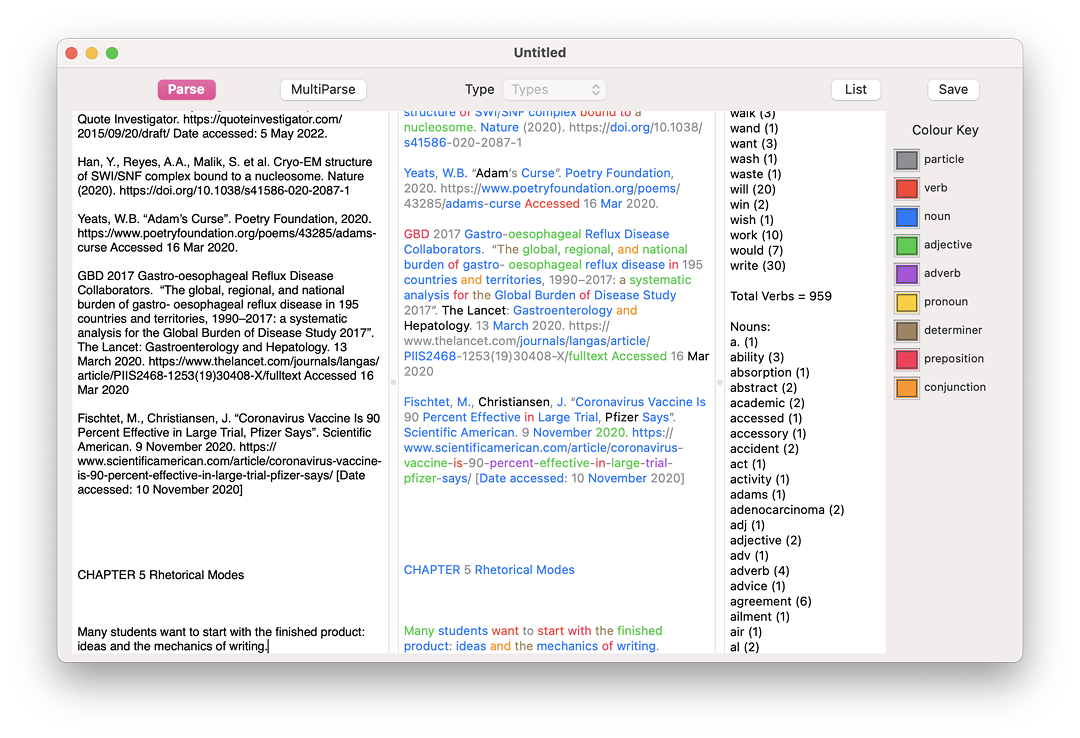
Naloprop - English text analysis
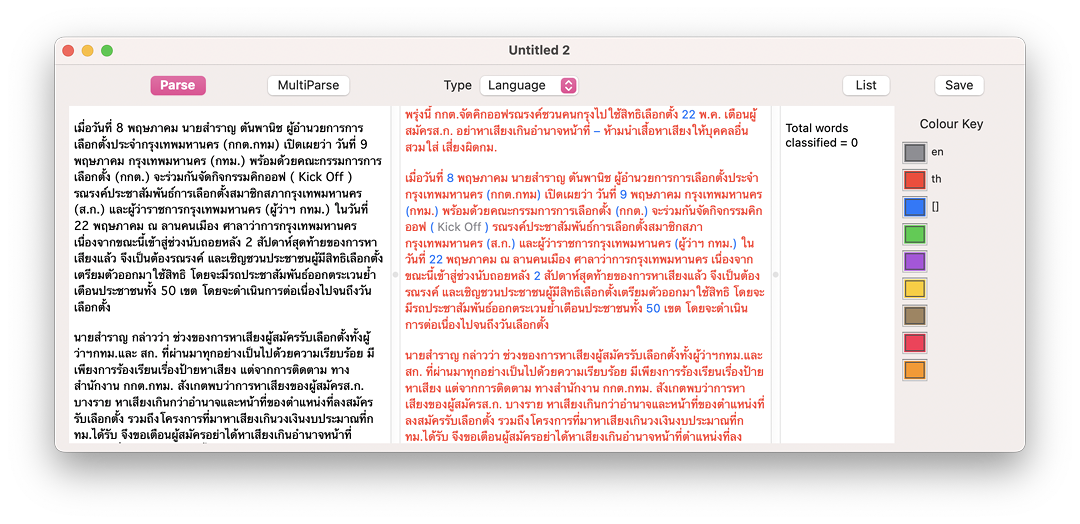
Naloprop - Thai text display
This week the Guardian had a review of one of my favorite movies, Cabaret, with Liza Minnelli, Michael York and Joel Gray. The movie is being re-released some 50 years after its original appearance. It won 8 Oscars as well as 7 BAFTAs and like The Devil Wears Pravda, I never tire of watching it. Having noted the re-release, I looked on the iTunes Store and was disappointed to see that not even the original was available here, although I think I have a DVD somewhere (but no DVD player). I noticed also that the panel advertising CODA had moved so clicked that to find that this is finally available here for download. I am delighted. I bought that too and will watch it over the weekend. But no Cabaret? . . . Over on Netflix, I am working through Breaking Bad for the second time and this has revealed much more. This series has some of the best television ever and Apple will have to work hard to beat such a series. Good points over at AppleTV+ so far for Foundation, Slow Horses, and Defending Jacob among others. That last featured Jaeden Martell as the young suspect. I had already seen him in The Book of Henry. This weekend, I randomly picked a movie called, Metal Lords. Martell was one of the two main stars and plays a pretty mean drummer in a heavy metal band: he practised for the part for a month with some impressive coaches. The movie seems to start out as a typical US high school light drama, but works well - particularly with some of the cameo appearances - earning the approval of Simon Abrams of Roger Ebert
Like the Lucasfilm workshop there is much more and Christian Zibreg (iDownloadBlog) links to an interesting YouTube video that has input from some of the technical staff. The documentary shows how some of the sounds are made (and stored) and looks round the establishment that is heavily into the use of Macs. If you want to know who is going to buy expensive Mac Studio and Mac Pro computers, here is one answer. The video was released by Apple as part of its Behind the Mac series.
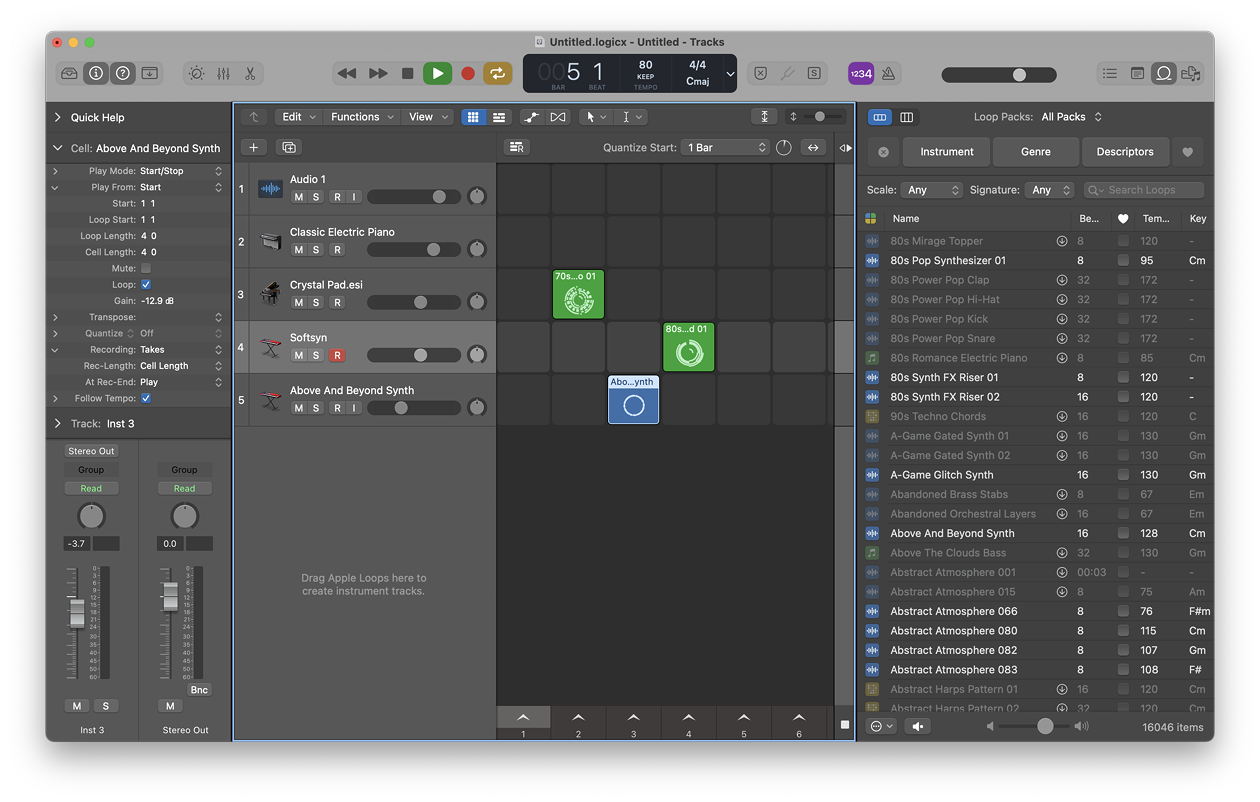
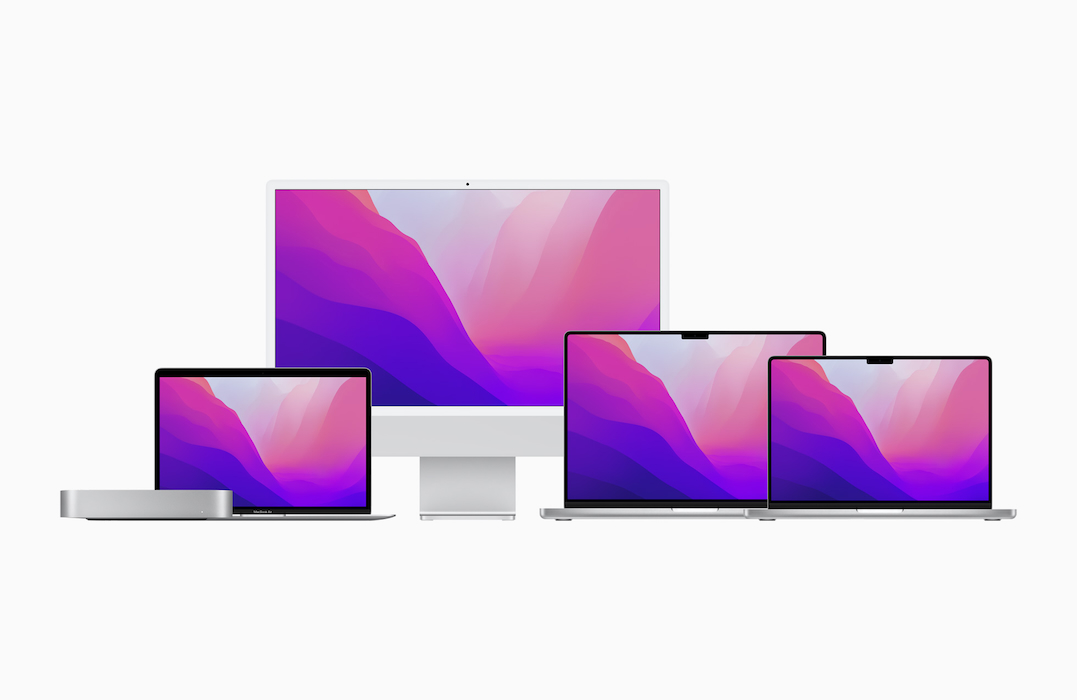
M1 Macs: Image courtesy of Apple
Gruber outlines how Apple has built a payment system that no one was really using, but now that everyone wants in the EU is helping them to unlock the door. Many critics complain (wrongly) that Apple does not innovate, but when something like this is developed and limits are placed on its use, people like Vestager see only the exclusiveness, and not the need to reward a company's hard work and investment: "That NFC card readers in retail point-of-sale terminals only work with credit and debit cards isn't Apple's fault or responsibility, and Apple Pay integrates with any and all credit and debit cards that choose to support Apple Wallet. The E.C. complaint would make more sense if Apple Card was the only card Apple Wallet supported, but it's not" (Gruber). Whatever Vestager says, sideloading is bad for your health. This is a view I have held for a long time, although it has not been fully supported by empirical evidence. I have been aware that those who jailbreak their phones and install unauthorized apps (sideloading) or who work with Android devices have different risks. Originally, there were no apps on iPhones, apart from what Apple released. The idea was that web-apps would do. That idea swiftly changed and the iTunes App Store was put together with its rules and developer fee cut. Overall it has worked and there have been adjustments (fees et al) over the years. Above all, the difficulties faced by developers are because Apple places a high priority on what the app does (its purpose) and how users are protected. Just to show that my fears are not fabricated and biased towards Apple, Jonny Evans at Apple Must has a comment on a recently released report concerning the risk that some Android users take even when downloading some apps from the Google Store. I am clearly not paranoid enough.
Last week one of my old Hasselblad 500c/m cameras broke. This needs more special care. It was also time for another camera, the lenses and parts to go for maintenance. I put them in a bag and used excessive amounts of bubble-wrap, but when I asked a secretary to contact the courier I used last time, we were told no collection. You have to take the items to the office. What is the point of advertising yourself as a courier service if it only works one way? This is inconvenient, particularly when several courier services (including the one I intended using) are visiting the place I work all day long.

Hasselblad 500c/m
However, as I went to the office to track down a suitable box, the FedEx van pulled up outside: less than 5 minutes after I had finished the call. The driver waited patiently while I found a box. Staff helped me fill it with protective paper and typed a label. I filled out the paperwork for the driver. With no membership, he needed my passport number for identification. When I paid the fee he declined a tip (I was so grateful for the help given) and the package was on its way. It arrived Thursday morning (Wednesday was a public holiday) and maintenance is being done.
Graham K. Rogers teaches at the Faculty of Engineering, Mahidol University in Thailand. He wrote in the Bangkok Post, Database supplement on IT subjects. For the last seven years of Database he wrote a column on Apple and Macs. After 3 years writing a column in the Life supplement, he is now no longer associated with the Bangkok Post. He can be followed on Twitter (@extensions_th) |
|

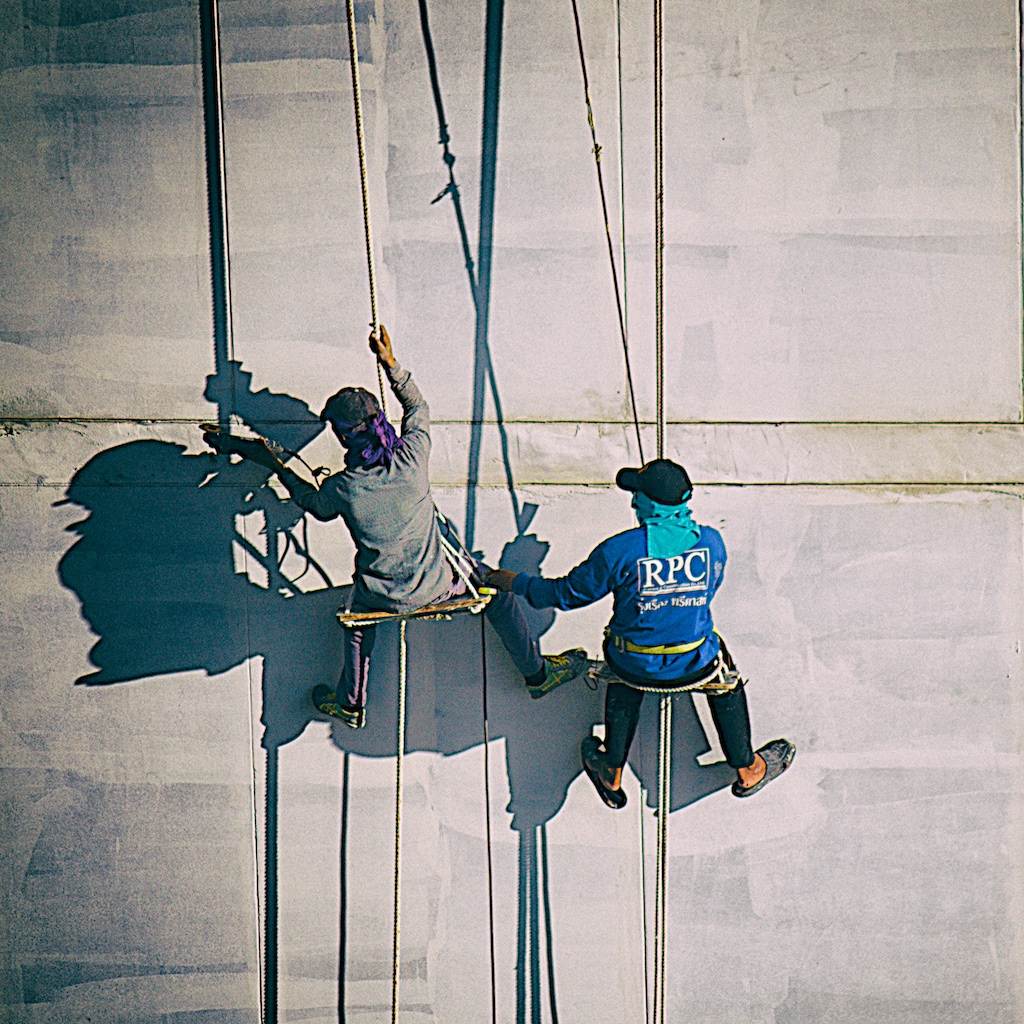
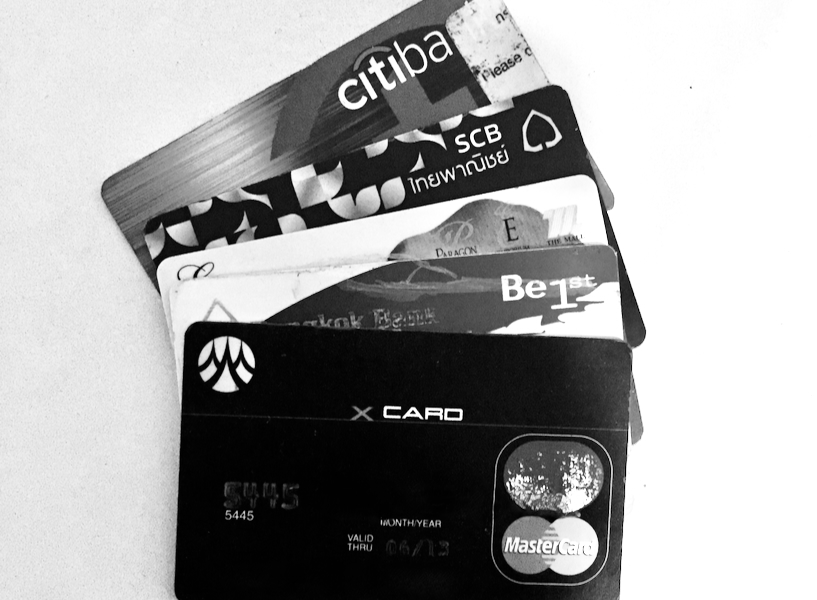 The authorities in India changed regulations concerning use of credit and debit cards some while back and now Apple (presumably other online stores too) are unable to accept these methods of payment for apps and other services. This has caused considerable inconvenience to users there. The only way to make purchases is to make sure the Apple account is in credit ("like a prepaid card") which is also causing some problems owing to the mechanisms of making these payments and ensuring the account is in the black.
The authorities in India changed regulations concerning use of credit and debit cards some while back and now Apple (presumably other online stores too) are unable to accept these methods of payment for apps and other services. This has caused considerable inconvenience to users there. The only way to make purchases is to make sure the Apple account is in credit ("like a prepaid card") which is also causing some problems owing to the mechanisms of making these payments and ensuring the account is in the black.
 The movie adds little to specific understanding of the events, but views the changes in the society from community to sectarianism through the eyes of one family. Although this is a (mainly) fictionalized version of events, Buddy is Branagh. Belfast is regarded as his most personal film. Although some viewers in the USA had complained the Belfast accent needed subtitles, I did not find this at all distracting. However, as I was watching in my AppleTV list, subtitles were provided. I should have turned those off.
The movie adds little to specific understanding of the events, but views the changes in the society from community to sectarianism through the eyes of one family. Although this is a (mainly) fictionalized version of events, Buddy is Branagh. Belfast is regarded as his most personal film. Although some viewers in the USA had complained the Belfast accent needed subtitles, I did not find this at all distracting. However, as I was watching in my AppleTV list, subtitles were provided. I should have turned those off.
